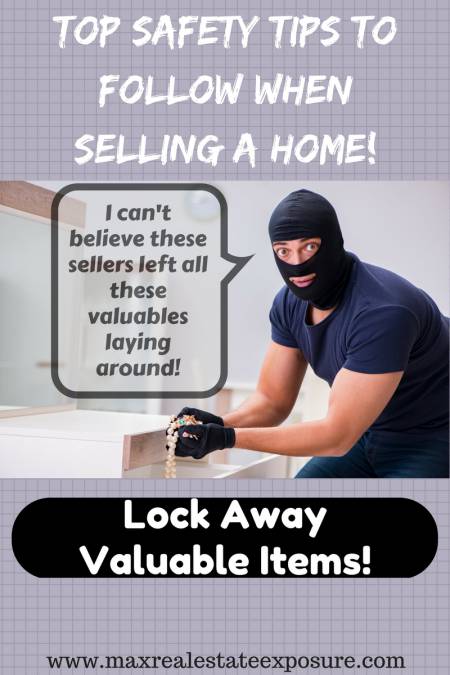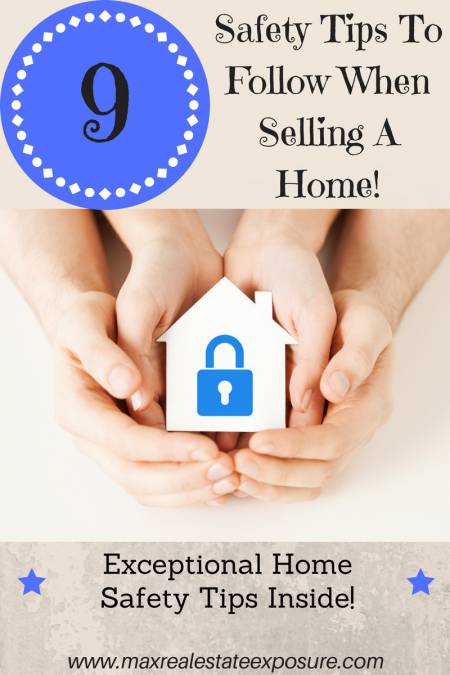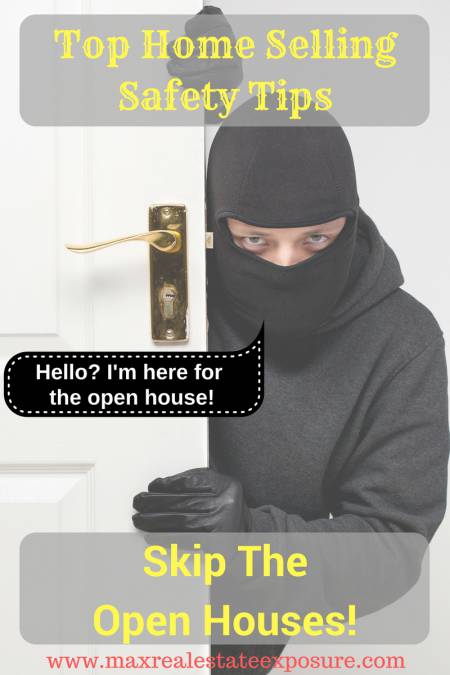What Safety Procedures Should I Follow When Selling My Home?
 Would you like the best-selling safety tips for homeowners preparing for the market?
Would you like the best-selling safety tips for homeowners preparing for the market?
When selling a home, dozens of questions run through a seller’s mind. Many of the most frequently asked questions from home sellers relate to interviewing agents, how to price a home, and the cost of selling a home.
One topic that isn’t normally running through a seller’s mind is what safety tips should be followed when selling a home. Why more sellers aren’t concerned about safety when selling a house is quite surprising.
The reality is that crime, such as theft and break-ins, can occur while selling your most prized possession. Homeowners must protect themselves and their property when selling a home.
Whether selling by owner or listing with a real estate agent, it’s essential to be vigilant.
As a Realtor who has been in the business for many years, it’s crucial for sellers to understand real estate safety. The moment you think something bad can’t happen to you, it will. That’s how life works.
Selling safety begins with understanding the types of dangers that can be lurking.
From experience, I will share the best safety tips you can use to keep your property and belongings safe.
If you are selling a house for the first time, you’ll get the advice you’ve probably never considered.
You Must Understand Real Estate Selling Safety Basics
Selling a house involves multiple steps, each with its safety considerations. Here are some of my favorite safety tips to keep in mind:
Preparation Stage
- Secure Personal Information: I recommend that all my clients put away bills, mail, and any personal documents that might be lying around. Identity theft is a risk during open houses and showings.
- Remove Valuables: Jewelry, electronics, and other valuables should be locked up or removed off-site.
- Depersonalize Your Space: It is also wise to remove family photos and personal items that could inform potential thieves about your identity and lifestyle.
During Showings and Open Houses
- Work with a Trusted Real Estate Agent: An experienced agent knows how to screen potential buyers and oversee visits to your home.
- Have a Sign-In Sheet: Use a sign-in sheet or digital registry for all guests. This adds a layer of security and helps if you need to contact visitors later. Many agents use Showing Time because it is easy to record people viewing the house.
- Securely Store Spare Keys: After viewings, ensure all spare keys are accounted for and never leave a hide-a-key outside.
- Use Electronic Lockboxes: These allow tracking of who accesses your home and offer an added layer of security over traditional lockboxes. I recommend these to all my clients.
- Monitor Viewings: Consider installing security cameras in common areas to monitor viewings. Ensure you disclose this to visitors and follow local laws. In some states, having security cameras while selling a property is illegal. Always consult with your agent on local regulations.
After Selling
- Change Locks: Once you’ve sold your house, I advise the new owners to change all locks for their safety and peace of mind.
- Final Checks: Do a final walkthrough to ensure you haven’t left any personal items behind and that all doors and windows are secure.
Online Safety
- Be Careful with Personal Information: When advertising your home online, be cautious about how much personal information you share.
- Verify Buyer’s Identity: Through your agent, ensure potential buyers are pre-approved for a mortgage. This helps avoid scams and non-serious inquiries.
Physical Safety
- Plan for Emergencies: Have a phone readily available with emergency numbers pre-saved during showings or open houses.
- Health Safety: This is especially pertinent during health crises. Ensure your home is sanitized, and consider requesting masks and hand sanitizer for visitors if serious viruses are being spread.
These tips can help protect you, your property, and your personal information throughout the selling process.
Discuss Showing Procedures With Your Realtor®
Some home sellers wonder if hiring a Realtor® to sell a home is worth it. There are dozens of reasons why hiring a Realtor® is worth it when selling a home.
One important reason is that a real estate agent can advise homeowners on protecting their home and themselves during a home sale.
It’s crucial when selling a home that showing procedures are discussed. Some of the most essential procedures to talk with your Realtor® include:
- Will a lock box be placed at your home?
- If a lockbox is placed at your home, which type is it?
- Will people and other agents know the home has a lockbox?
- Who is responsible for securing the home?
- Who will watch prospective buyers as they view the home?
- How will the showings be tracked?
Sellers should discuss these questions and procedures with their Realtor®, well before showings begin. Some real estate agents will indicate in their listings that the property has a lockbox, especially if they’re selling a vacant home.
This is not recommended because tracking showings becomes more difficult for the listing agent. In addition to the difficulty of monitoring showings, some agents will likely give buyers a lockbox combination even though they absolutely should not.
Use an Electronic Lockbox For Selling Safety
Putting a lockbox on a home while selling is prevalent if it’s the proper type. The ideal and safest lockbox is an electronic lockbox that can only be accessed by real estate professionals.
Your real estate agent can read An electronic lock box if there is a problem. Electronic lock boxes record the date, time, agent, and who they work for. In the real estate industry, these are known as Supra Keys.
If there was a problem, your agent could see exactly who entered the home and when—a nice perk for using this lockbox.
Don’t Let Anyone in Who Comes Without an Appointment
One of the most essential pieces of advice is NEVER to let a stranger into your home. Occasionally, someone will see the for sale sign on your lawn and be brave enough to knock on your door. They will say something to the effect that they love your home and would love to take a peek inside. DO NOT let them in!
While the percentages strongly suggest that this is someone interested in your home, you never know. It is advisable to politely say I am sorry and ask them to call your real estate agent or theirs. They will schedule a showing if they genuinely want to see the home.
Pam Pester of Mobiliti CRE offers her excellent insights about selling safety.
“I always tell my sellers not to let anyone in the house without their agent. Sure, there may be buyers wandering the street looking at homes who may want to stop in. However, it’s in the best interest of both the seller and the buyer to not allow entrance without their agent or even an appointment.
I know that short notices can happen, but the best way for sellers to deal with folks randomly knocking on their door to see the house is to ask them to call their buyer agent. The appointment will be on the record, and if they don’t have one, contact the listing agent and inform them of what’s happening.
Everyone wants to be safe, and if the seller gets pushback from the potential buyer, that could be a big red flag. Trying to keep things on the up and up only makes sense for everyone’s safety. I typically tell the seller to inform the buyer that they are free to look from the street but to either set an appointment or contact their agent so everyone knows what’s happening.
Any pushback should be concerning.”
Lock Away Any Valuable Items
 Far too often, real estate agents see valuable items around a home while showing it.
Far too often, real estate agents see valuable items around a home while showing it.
When selling, a somewhat obvious but crucial safety tip is to lock away any valuable items during showings.
Valuable items that should be locked away while selling a home include jewelry, money, car keys, credit cards, and house keys.
A secure safe is ideal for storing valuables while selling a home. If you don’t happen to have one, removing these items while the house is being shown is recommended.
Remove Prescription Drugs & Medication
Another safety measure to consider while selling a home is to remove all prescription drugs and medication.
A couple of years ago, many stories were being heard from home sellers relating to stolen prescription drugs and medications.
When selling a home, it’s suggested that you clean out any medicine cabinets and other places where drugs and medication may be stored, such as kitchen drawers/cabinets or nightstands.
Put Away Bills, Calendars, Invitations, & Other Mail Pieces
One of the most significant crimes nowadays in the United States is identity theft. Criminals can steal a person’s identity reasonably quickly and with limited information about a person.
Another safety tip when selling a house is to put away personal bills, calendars, invitations, and other mail. These items often contain essential personal information, and if they end up in the wrong person’s hands, they can easily lead to identity theft.
In addition to identity theft, there is also a risk that account numbers are present on things received in the mail. The bottom line is to put away anything that could lead to identity theft or give someone information about your whereabouts, such as a calendar or invitations.
All it takes is for a thief to pick up one of your credit card bills, and they will have your account numbers. Don’t take a chance on this happening.
Password Protect Your Computer
Criminals are becoming more elusive in the ways they come up with to rip people off. Another excellent safety tip when selling your home is to password-protect your computer.
For a criminal, spending a few minutes and getting into areas of your computer where significant account numbers could be found would be straightforward. While this may seem extreme, it is always better to be safe than sorry!
Paul Lopez, a real estate agent with Property Sourced, has some sound advice to follow.
It is essential for homeowners to always lock your computer screen when leaving for house viewings. This can usually be done quickly with a keyboard shortcut (e.g., Windows key + L on Windows PCs).
I also advize using a combination of numers, letters, and special characters for all passwords. You should make them impossible to guess. Try to have your password be 12 characters or longer. Don’t use easy combinations to guess like names or birthdays.
Depersonalize Your Home
One of the best tips for preparing a home for sale is depersonalization. Personal items can often distract buyers while they’re viewing a home. This takes away from the primary purpose of looking at the house, which is to look at the property, not the personal items.
Depersonalizing a home is also a safety tip to follow when selling a home. One of the most important pieces of real estate marketing is the photographs that are posted online.
Once a home is listed for sale and entered into the local MLS (Multiple Listing Service), the information and photos of the property are sent to hundreds of real estate websites.
Photos of homes for sale are available to every Tom, Dick, and Harry, and having personal pictures of a child or family online could be dangerous. Nowadays, a popular decorating touch for a child’s room is having their name written on their bedroom wall.
Removing this decorating touch before listing a home for sale is a safety tip for selling a home with kids.
Skip Open Houses
 Last but certainly not least, skipping open houses is sound home-selling safety advice. Open houses are very controversial with real estate agents and home sellers.
Last but certainly not least, skipping open houses is sound home-selling safety advice. Open houses are very controversial with real estate agents and home sellers.
Many sellers grapple with the question, “Are open houses necessary to sell a home?”
The answer is NO! Less than 2% of homes sell directly from an open house.
Open houses are a fantastic opportunity for real estate agents to meet prospective buyers. The problem is that most real estate agents who advocate for open houses don’t disclose to their sellers that they’re benefiting the most from the open house.
While open houses potentially offer an excellent opportunity for real estate agents to prospect, they’re also a fantastic invitation for crime.
Knowing precisely who walks through the home is impossible during an open house.
In addition to not knowing who is walking through the home, it’s difficult for an agent to watch all attendees at a busy open house.
There are significantly more downsides to an open house than positives. The problem is anyone can go, and most of the time, it’s not the people you want in your home.
Have Private Showings Only
The best way to sell a home is to have private showings, which require a buyer to contact a real estate professional to schedule a showing.
This allows a real estate professional to screen potential buyers to make sure they are who they say they are and that they’re pre-approved for a mortgage to buy the home.
Saying no to open houses will not kill a home sale. If a home is priced right and marketed correctly, it will sell without open houses.
Not having open houses is simple yet effective in selling safety.
Think About Home Security Cameras
If you sell a luxury home with many valuables or want extra precautions, consider installing home security cameras around your property. Safewise has some great options for home security devices that you can add pretty inexpensively.
Remember, you can take these to your next home, so it’s not a bad investment.
If there is a problem, you can be sure it will be caught on camera. As mentioned, check local laws to ensure you are not violating regulations. You don’t want to be sued!
Final Thoughts
Safety is often overlooked when selling a home, which can be a big mistake. All homeowners should know the above safety tips when selling a house. This is especially vital in neighborhoods with a high crime rate.
Following these home-selling safety tips can be the difference between a crime occurring during a sale.
Other Real Estate Safety Resources
- Open house security tips: Anita Clark provides valuable tips for real estate safety when opening your house to strangers.
- Keep your home safe when selling: Paul Sian provides additional selling safety tips for homeowners that are worth reading.
- How to prevent theft at an open house – Maximum Real Estate Exposure shares excellent advice on how to lower the odds of having someone steal your possessions at an open house.
Use these additional resources to keep your home safe when it is up for sale!
About the author: Kyle Hiscock, one of the top Rochester, NY Realtors with RE/MAX Realty Group, wrote this article on safety tips when selling your home. He is also the founder and owner of Rochester Real Estate Blog, where he frequently publishes helpful real estate-related content.

